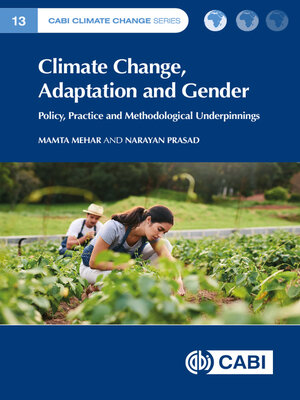Climate Change, Adaptation and Gender
ebook ∣ Policy, Practice and Methodological Underpinnings · CABI Climate Change Series
By Mamta Mehar

Sign up to save your library
With an OverDrive account, you can save your favorite libraries for at-a-glance information about availability. Find out more about OverDrive accounts.
Find this title in Libby, the library reading app by OverDrive.



Search for a digital library with this title
Title found at these libraries:
| Library Name | Distance |
|---|---|
| Loading... |
This book offers a wide, in-depth study of the gender-climate change-agriculture nexus. The crux of understanding these connections comprises gender equality and tools to measure gender discrimination, the evolution of the concept of gender inclusiveness and its concerns; and the need to address the same by formulating gender-inclusive policymaking. Despite the fact that more than 50 years have elapsed since gender concerns were included in explorations of this nexus, there is still ambiguity around the foundations, connections, and approaches for planning gender-inclusive climate policies. This book aims to clear that ambiguity by: · Being the first to explore exclusively this issue in detail.
· Revealing how and why consideration of gender is so important for understanding how climate change impacts rural communities and agricultural systems globally.
· Exploring every dimension of climate change (including belief systems and perceptions, knowledge, experience, coping strategies, adaptation, and mitigation strategies) and linking it to gender. It includes new theoretical and methodological approaches that go far beyond the household as the unit of analysis (using various approaches, including intersectional analysis). The book not only throws light on major themes of research, but also covers different methodologies ranging from review methods to mathematical models, conceptual frameworks and empirical analysis. It will be of wide interest to students, scholars, and researchers in gender studies, agriculture, climate change and rural development research, and also to practitioners, extension workers, and planners designing new climate-resilient practices.







